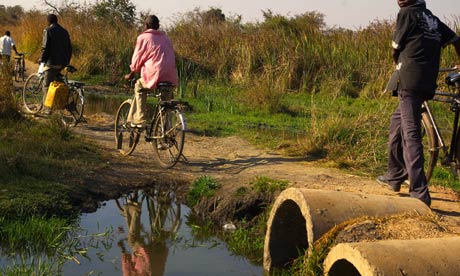
In Zambia's Central province, men have started cycling long distances to undergo a traditionally stigmatised procedure: circumcision. According to Fred Mbewe, who performs circumcisions at Nangoma Mission hospital, men bear the pain – both from the surgery and the bumpy bike ride the following day – to protect themselves against HIV.
Zambia has become active in fighting HIV, largely because of the toll the disease has taken on the country, which has the sixth highest infection rate in the world, at 13.5%. It is estimated 200 Zambians become infected with the virus every day.
In addition to distributing condoms and sterile needles to prevent transmission, experts are turning to male circumcision as an HIV prevention strategy. According to some – though, importantly, not all – scientific studies, male circumcision can reduce female to male transmission by up to 60%. This means that the risk of a man contracting the disease from an HIV-positive woman decreases by more than half if he is circumcised. The procedure is relatively inexpensive, which is attractive for donors.
Given its low cost and purported effectiveness, policymakers and donors across Africa have started aggressively pushing circumcision as a prevention strategy. The US President's Emergency Plan for Aids Relief (Pepfar) programme has a target of 1.9 million circumcised men in Zambia by 2015, up from an estimated 200,000 now. Donors such as the Global Fund to Fight Aids, Tuberculosis and Malaria and the Gates Foundation are also funding circumcision.
To garner local support, especially in parts of Zambia where men are not traditionally circumcised, foreign donors have been meeting traditional leaders. "The feeling [among the 27 traditional leaders we met] was: 'If you give us funds, we will make sure all our men are circumcised'," said Pepfar country co-ordinator Kristie Mikus.
After learning about the benefits of male circumcision, Chief Mumena of Zambia's North-western province decided to get circumcised. "If it's good enough for others, it's good enough for me," he said. He hopes his example will encourage others in his region.
Donors are training health workers to conduct circumcisions at local health centres. The Global Fund supports a two-week circumcision training programme, which enables people like Mbewe to conduct the procedure. Mbewe passes information about circumcision's benefits and risks to volunteer community health workers, who spread the message throughout villages.
"We were told of benefits, about 60% prevention of disease," said 45-year-old Joshua Mwangala, a volunteer health worker who was circumcised. The volunteer health workers tell people how hygienic circumcision is and how it can prevent cervical cancer in women. The potential risks and limitations of male circumcision are relatively muted. Health workers are informed of the infections that could result from the process, but still encourage community members to undergo the procedure.
One concern is whether everyone understands that a 60% reduction in HIV risk does not obviate the need for condoms. "We tell people it's not a passport to have unprotected sex," said Gideon Mwiinga, a 63-year-old healthworker. "But we know there are people who don't use condoms after being circumcised." Clement Chela, director general of Zambia's National Aids Council, said he was unsure how widespread the perception is.
"Male circumcision," said Zambian Aids activist Mannaseh Phiri, "is the best vaccine in Africa." Yet some scientists, like J Steven Svoboda, worry that circumcision will lull men into a false sense of security, which he believes will "lead to a decrease in condom use and [ultimately] endanger women".
Some are also concerned about the effect circumcision could have on the country's homosexual population. According to several recent studies, the procedure has no significant protective effect against HIV transmission in homosexual men. Yet this nuance is virtually absent in circumcision advice in Zambia, which criminalises homosexual behaviour. "The messaging around circumcision is not holistic," said Lundu Mazoka, a Zambian gay rights activist. "It needs to be coherent with the science."
• Sarika Bansal travelled to Zambia with the Global Fund to Fight Aids, Tuberculosis and Malaria

